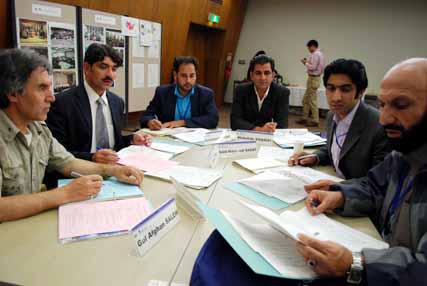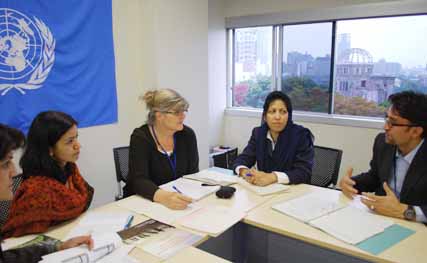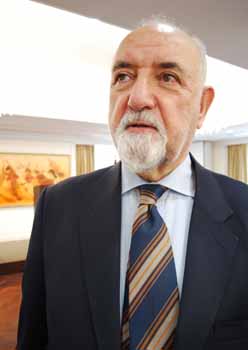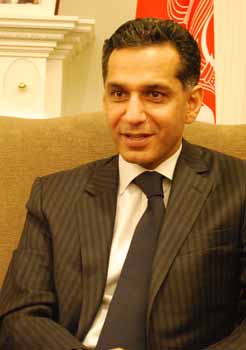Hiroshima offers support for Afghanistan’s recovery
Dec. 9, 2008
by Miho Kuwajima, Staff Writer
United States President-elect Barack Obama has said that Afghanistan will be the main battleground in the war on terror during his administration. Amid growing international interest in the nation, the Afghanistan scholarship project of the Hiroshima office of the United Nations Institute for Training and Research has entered its sixth year. The project is intended to contribute to the rebuilding of Afghanistan by Afghans themselves by providing skills development training to members of the government and international non-governmental organizations as well as engineers. Seven years have passed since the fall of the Taliban regime, and amid growing concern about deteriorating security, this small-scale aid effort, which consists of support from Hiroshima Prefecture and the City of Hiroshima, is steadily laying the foundation for Afghanistan’s recovery.
“It is a small project, but it is playing a major role in the recovery of our country,” said Hedayat Amin-Arsala, 66, a senior minister of Afghanistan, said to the trainees on November 10 when he addressed them at the Embassy of Afghanistan in Japan following completion of their training in Hiroshima.
This year there were 24 trainees. In addition to diplomats and scholars, they included middle managers from the ministries of health and economy, engineers in charge of regional road construction and employees of international organizations. They were selected from among 200 applicants.
During the eight-month program, which began in April, participants pursued training in areas they selected based on problems they had encountered while continuing to work in Afghanistan. The training was intended to enhance their managerial ability and job performance. Among the topics selected were establishing infrastructure and a health care system in outlying regions, promoting women’s advancement in society and setting up a website for a university.
The training was conducted under the direction of Nassrine Azimi, director of UNITAR’s Hiroshima office, as well as professors from Hiroshima University and others overseas including businessmen in the U.S., Canada, and Singapore--a total of 19 lecturers all together. The students took an intensive course in India and received instruction via teleconference and e-mail on a daily basis. The trainees who successfully completed all of their projects received a certificate for completing the course during the last week of training in Hiroshima.
The aid project began in the fall of 2003 just after Hiroshima Prefecture invited UNITAR to establish an office here. Amin-Arsala, who was then Afghanistan’s vice president, oversaw the initial stages of the project. “I never thought it would be this fruitful,” he said.
According to data gathered by the United Nations Development Program in 2006, as a result of the 30-year conflict and repeated bombing, the average life expectancy of Afghanis has been cut to 45, and the adult literacy rate has fallen to below 30%. The country’s infrastructure has been destroyed, and a safe water supply is available in only 18% of areas outside the capital. Large-scale support is necessary, and this year 68 countries and 17 international organizations pledged to provide a total of more than $20 billion. The Japan International Cooperation Agency and other organizations in Japan are also offering aid on a large scale.
So why has this program, which operates on a budget of about $300,000 and with a staff of 30 and for which Amin-Arsala has expressed the government's strong support, assumed such importance?
Haron Amin, 39, Afghanistan’s ambassador to Japan, has been involved in the training program since his appointment in 2004. He cited two points as the program’s strengths: 1) its effectiveness as a result of its selection of outstanding participants and 2) the trainees are highly motivated because the government and people of Hiroshima are involved in the program.
Humaira Kamal, 40, a training associate with UNITAR’s Hiroshima office, puts together the program’s curriculum every year. “Because it’s a small-scale program we have been able to continually improve it,” she said. She also noted that she learned a lot from failures in the program’s first year.
Just after the establishment of Afghanistan’s transitional government, UNITAR had no connections in Afghanistan, so they recruited participants through the U.N. field office in Afghanistan and other agencies. But they found that these initial participants were far from capable of leading Afghanistan’s recovery, so that year’s program focused on English language and computer courses.
UNITAR realized that the selection of trainees was critical, and starting in the program’s second year they asked graduates of the previous year’s program to recommend and interview candidates from the public and private sector. They also established a system under which outstanding graduates return the following year to serve as “coaches.”
Last year a program office staffed by a graduate was set up in the capital of Kabul and the alumni network was strengthened. During the selection process, candidates’ supervisors and coworkers are asked about the candidates’ potentials, personalities, and other traits. This has allowed the staff to identify people who will be needed to help rebuild the country.
Mohammad Amir Foladi, 35, who coordinates tourism in the Bamiyan region of Afghanistan, participated in the program last year and served as a coach this year. “I have many opportunities to make use of what I learned in the training program, not only when supervising local staff members but also when negotiating with donor countries,” he said.
Coming up with a strategy to achieve goals is another important element of the training. Gul Afghan Saleh, 50, an engineer, is developing Afghanistan’s water system. He said he would map out a strategy that addresses sanitation and flood control before proceeding.
Since the Soviet invasion in 1979, there has been continual civil war and terrorism under the Mujahadeen and Taliban regime. For the Afghans, who have endured years of strife, their relationship with Hiroshima is highly significant.
Kamal Safi, 34, an engineer working on regional development in Kandahar, said that seeing the contrast between the Atomic Bomb Dome and the surrounding area made him realize how high the aspirations of the Hiroshima citizens had been and how hard they had worked to rebuild the city. “It is stressful living in Afghanistan knowing that you might die any day, but I think of Hiroshima’s miraculous recovery as I work toward regional development,” he said.
A military coup d’etat took place when Najla Sabri was 3 years old, and she has not known peace since. Sabri, 33, who works in the Office of the Special Representative of the European Union for Afghanistan, said that when she heard A-bomb survivors describe their experiences she felt even more strongly that she must overcome life’s difficulties to be able to live in peace someday.
Awareness of this project in Hiroshima is extremely low. The budget allocated to it by the prefecture has been gradually shrinking, and the local business community, which was initially cooperative, has cut off support.
Kenzo Oshima, 65, senior vice president of JICA, said, “Amid growing international interest in support for Afghanistan, this aid project in Hiroshima is highly significant. UNITAR and Hiroshima Prefecture need to get funding from overseas and take other measures to ensure the project’s future,” he said. He indicated he would also look into collaboration with JICA.
An interview with Haron Amin, Afghanistan’s Ambassador to Japan
Since the Soviet invasion in 1979 most of the intellectuals and government officials in Afghanistan have been removed from their posts and deported. The know-how needed to run the nation and local governments has not progressed beyond where it was 30 years ago, and we began receiving international aid in 2002.
Whether or not we can make the best use of that aid depends on the strength of our country. The training offered by UNITAR’s Hiroshima office has produced excellent results with a small budget. If the project continues, it will contribute to Afghanistan’s self-reliance.
I have visited Hiroshima twice, and both times I wondered whether the difference between Hiroshima and Afghanistan really lies in the nuclear attack. In Afghanistan as well, children are blown to bits in attacks on a daily basis.
Hiroshima recovered from the devastation of the atomic bombing to become the prosperous city it is today. The Afghan trainees recognize the significance of that accomplishment. I want the people of Hiroshima to know that the trainees are greatly encouraged and filled with hope because of this.
The past two or three years have seen a resurgence of the Taliban and Al-Qaeda, and this has created extremely unstable conditions in Afghanistan. The expression of support by President-elect Obama was welcome, but terrorism can’t be rooted out by military force alone.
Many members of the Taliban have no jobs and their relatives have been killed in the turmoil. This provides the motivation for their activities. We need to identify the moderate elements of the Taliban and negotiate with them. A comprehensive policy that addresses the military, government, and the economy is essential. I would like to train people for these tasks through this scholarship program.
(Originally published on December 1, 2008)
Related articles
UNITAR Hiroshima supports new encyclopedia compiled by Afghan trainees (Nov. 6, 2008)
United States President-elect Barack Obama has said that Afghanistan will be the main battleground in the war on terror during his administration. Amid growing international interest in the nation, the Afghanistan scholarship project of the Hiroshima office of the United Nations Institute for Training and Research has entered its sixth year. The project is intended to contribute to the rebuilding of Afghanistan by Afghans themselves by providing skills development training to members of the government and international non-governmental organizations as well as engineers. Seven years have passed since the fall of the Taliban regime, and amid growing concern about deteriorating security, this small-scale aid effort, which consists of support from Hiroshima Prefecture and the City of Hiroshima, is steadily laying the foundation for Afghanistan’s recovery.
“It is a small project, but it is playing a major role in the recovery of our country,” said Hedayat Amin-Arsala, 66, a senior minister of Afghanistan, said to the trainees on November 10 when he addressed them at the Embassy of Afghanistan in Japan following completion of their training in Hiroshima.
This year there were 24 trainees. In addition to diplomats and scholars, they included middle managers from the ministries of health and economy, engineers in charge of regional road construction and employees of international organizations. They were selected from among 200 applicants.
During the eight-month program, which began in April, participants pursued training in areas they selected based on problems they had encountered while continuing to work in Afghanistan. The training was intended to enhance their managerial ability and job performance. Among the topics selected were establishing infrastructure and a health care system in outlying regions, promoting women’s advancement in society and setting up a website for a university.
The training was conducted under the direction of Nassrine Azimi, director of UNITAR’s Hiroshima office, as well as professors from Hiroshima University and others overseas including businessmen in the U.S., Canada, and Singapore--a total of 19 lecturers all together. The students took an intensive course in India and received instruction via teleconference and e-mail on a daily basis. The trainees who successfully completed all of their projects received a certificate for completing the course during the last week of training in Hiroshima.
The aid project began in the fall of 2003 just after Hiroshima Prefecture invited UNITAR to establish an office here. Amin-Arsala, who was then Afghanistan’s vice president, oversaw the initial stages of the project. “I never thought it would be this fruitful,” he said.
According to data gathered by the United Nations Development Program in 2006, as a result of the 30-year conflict and repeated bombing, the average life expectancy of Afghanis has been cut to 45, and the adult literacy rate has fallen to below 30%. The country’s infrastructure has been destroyed, and a safe water supply is available in only 18% of areas outside the capital. Large-scale support is necessary, and this year 68 countries and 17 international organizations pledged to provide a total of more than $20 billion. The Japan International Cooperation Agency and other organizations in Japan are also offering aid on a large scale.
So why has this program, which operates on a budget of about $300,000 and with a staff of 30 and for which Amin-Arsala has expressed the government's strong support, assumed such importance?
Haron Amin, 39, Afghanistan’s ambassador to Japan, has been involved in the training program since his appointment in 2004. He cited two points as the program’s strengths: 1) its effectiveness as a result of its selection of outstanding participants and 2) the trainees are highly motivated because the government and people of Hiroshima are involved in the program.
Humaira Kamal, 40, a training associate with UNITAR’s Hiroshima office, puts together the program’s curriculum every year. “Because it’s a small-scale program we have been able to continually improve it,” she said. She also noted that she learned a lot from failures in the program’s first year.
Just after the establishment of Afghanistan’s transitional government, UNITAR had no connections in Afghanistan, so they recruited participants through the U.N. field office in Afghanistan and other agencies. But they found that these initial participants were far from capable of leading Afghanistan’s recovery, so that year’s program focused on English language and computer courses.
UNITAR realized that the selection of trainees was critical, and starting in the program’s second year they asked graduates of the previous year’s program to recommend and interview candidates from the public and private sector. They also established a system under which outstanding graduates return the following year to serve as “coaches.”
Last year a program office staffed by a graduate was set up in the capital of Kabul and the alumni network was strengthened. During the selection process, candidates’ supervisors and coworkers are asked about the candidates’ potentials, personalities, and other traits. This has allowed the staff to identify people who will be needed to help rebuild the country.
Mohammad Amir Foladi, 35, who coordinates tourism in the Bamiyan region of Afghanistan, participated in the program last year and served as a coach this year. “I have many opportunities to make use of what I learned in the training program, not only when supervising local staff members but also when negotiating with donor countries,” he said.
Coming up with a strategy to achieve goals is another important element of the training. Gul Afghan Saleh, 50, an engineer, is developing Afghanistan’s water system. He said he would map out a strategy that addresses sanitation and flood control before proceeding.
Since the Soviet invasion in 1979, there has been continual civil war and terrorism under the Mujahadeen and Taliban regime. For the Afghans, who have endured years of strife, their relationship with Hiroshima is highly significant.
Kamal Safi, 34, an engineer working on regional development in Kandahar, said that seeing the contrast between the Atomic Bomb Dome and the surrounding area made him realize how high the aspirations of the Hiroshima citizens had been and how hard they had worked to rebuild the city. “It is stressful living in Afghanistan knowing that you might die any day, but I think of Hiroshima’s miraculous recovery as I work toward regional development,” he said.
A military coup d’etat took place when Najla Sabri was 3 years old, and she has not known peace since. Sabri, 33, who works in the Office of the Special Representative of the European Union for Afghanistan, said that when she heard A-bomb survivors describe their experiences she felt even more strongly that she must overcome life’s difficulties to be able to live in peace someday.
Awareness of this project in Hiroshima is extremely low. The budget allocated to it by the prefecture has been gradually shrinking, and the local business community, which was initially cooperative, has cut off support.
Kenzo Oshima, 65, senior vice president of JICA, said, “Amid growing international interest in support for Afghanistan, this aid project in Hiroshima is highly significant. UNITAR and Hiroshima Prefecture need to get funding from overseas and take other measures to ensure the project’s future,” he said. He indicated he would also look into collaboration with JICA.
An interview with Haron Amin, Afghanistan’s Ambassador to Japan
Since the Soviet invasion in 1979 most of the intellectuals and government officials in Afghanistan have been removed from their posts and deported. The know-how needed to run the nation and local governments has not progressed beyond where it was 30 years ago, and we began receiving international aid in 2002.
Whether or not we can make the best use of that aid depends on the strength of our country. The training offered by UNITAR’s Hiroshima office has produced excellent results with a small budget. If the project continues, it will contribute to Afghanistan’s self-reliance.
I have visited Hiroshima twice, and both times I wondered whether the difference between Hiroshima and Afghanistan really lies in the nuclear attack. In Afghanistan as well, children are blown to bits in attacks on a daily basis.
Hiroshima recovered from the devastation of the atomic bombing to become the prosperous city it is today. The Afghan trainees recognize the significance of that accomplishment. I want the people of Hiroshima to know that the trainees are greatly encouraged and filled with hope because of this.
The past two or three years have seen a resurgence of the Taliban and Al-Qaeda, and this has created extremely unstable conditions in Afghanistan. The expression of support by President-elect Obama was welcome, but terrorism can’t be rooted out by military force alone.
Many members of the Taliban have no jobs and their relatives have been killed in the turmoil. This provides the motivation for their activities. We need to identify the moderate elements of the Taliban and negotiate with them. A comprehensive policy that addresses the military, government, and the economy is essential. I would like to train people for these tasks through this scholarship program.
(Originally published on December 1, 2008)
Related articles
UNITAR Hiroshima supports new encyclopedia compiled by Afghan trainees (Nov. 6, 2008)











